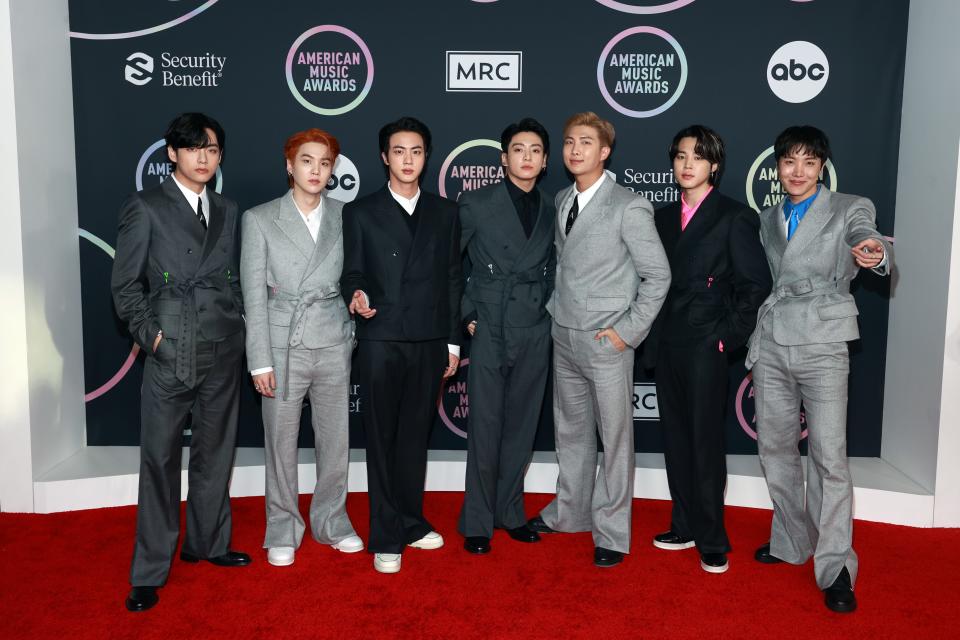BTS announces they're taking a break: How the group is changing 'cutthroat' K-pop culture
After racking up Grammy nominations and numerous No.1 hits, BTS is taking a much-needed break.
"This period of rest will provide the members of BTS, who have tirelessly committed themselves to their activities, a chance to get re-inspired and recharge with creative energy," the group's management team, Big Hit, said in a statement Sunday.
"It will also be the first time for them since their debut to spend the holiday season with their families. We kindly ask once again that you show consideration for their need to enjoy ordinary and free, everyday lives while solely concentrating on themselves, albeit for a short while, during their period of rest. BTS will be focusing on preparing for the concert and release of the new album that will mark the beginning of a 'new chapter.'"
Experts say it's "admirable" for the group to prioritize their well-being in a culture plagued by mental health taboos. South Korea has one of the highest suicide rates among developed countries, and has seen string of suicides in its music industry.
"Everyone needs a break, and that is a really powerful message," says Jo Elfving-Hwang, an associate professor and director of the Korea Research Centre at the University of Western Australia.
"BTS is a global phenomenon, and publicly saying they need time for themselves breaks the mold of the typical image of the K-pop industry, which is 24/7 availability."
'It still feels surreal': BTS makes Grammys history, whether they win on Sunday or not
RIP: Jonghyun, K-pop star and SHINee singer, dies in possible suicide
Why South Korea's suicide rate is so high
Like many East Asian countries, South Korea is known for its highly competitive, individualistic culture, which was largely shaped by its rapid globalization in recent years.

"The nature of competitiveness in Korea is merciless and relentless," says Hyeouk Chris Hahm, a professor at Boston University's School of Social Work. "After being occupied by a military dictator, Korea became much more individualized and egalitarian, and society became very competitive… and as a result, people started experiencing more psychosocial stressors."
This is one of many reasons South Korea has one of the highest suicide rates among OECD member nations, she says. A 2016 study found that even though 30% of South Koreans suffer from mental illnesses, only half seek treatment.

This is America: Stop gaslighting me with the Asian 'model minority' myth
"Mental health has traditionally been a taboo subject in South Korea. It's always been seen as a reflection of character, temperance and maturity," says Anson Au, a sociologist at the University of Toronto. As a result, stress is normalized as "a part of life that everyone inevitably goes through," and "what results is immense pressure to conform and suppress any mental health issues."
K-pop stars face additional unique challenges. These celebrities are recruited at a young age and often live and train at a company away from their parents.
"It's a cutthroat agency," Elfving-Hwang adds. "You're practically owned by the company… and grow up in such a high pressure, high visibility profession without your family around you. But you've also got to perform 24/7 to your fandom. You have to be available online, post things constantly, and the expectations are huge – not just the expectation to be available, but also being perfect all the time."
More on K-pop: ‘Squid Game,’ K-beauty and BTS - What’s so special about Korean pop culture?
Is the industry changing or is BTS an exception?
When a group as big as BTS uses their platform to advocate for mental health, it's inspirational, Elfving-Hwang says:
"It's a big statement to say, 'we're going to give ourselves a break,' because they've been running like crazy, and it's important to recognize that anyone should have balance, family time and time for themselves."
But BTS may have a limited impact on systemic changes for other influencers, since the group's international success "gives them disproportionately more power than any other K-pop performer in the industry."
Most recently, the group sold more than 200,000 tickets for their Dec. 2 Los Angeles concert – earning the sixth-highest grossing engagement in Billboard Boxscore history.

Music: BTS wins song of summer with 'Butter,' returns to No. 1 and enters Guinness' Hall of Fame
"People might feel more at ease to talk about their mental health issues now, but that doesn't take away from the inequality or working culture that created them in the first place," Au cautions. "So the stressors may still be there."
Hahm adds that the mental health challenges in the industry are exacerbated for female performers, who are at higher risk for gender violence and sexual harassment.
"When men make mistakes, society as a whole is more likely to forgive them," Hahm says "But for women to expose their mistakes, or come out with bold feminist statements or aren't wearing bras like Sulli (who died by suicide in 2019), then fans will just ostracize them."
That isn't to say change won't come in Korea. It will just take time.
"K-pop is a very intense industry and going into it quite young can be extremely hard," Elfving-Hwang says. "That's why having bands like BTS openly putting out statements saying, 'OK, we need a break,' will hopefully give other production companies and artists permission to focus on their well-being."
More: Korean American K-pop stars promote mental health awareness
If you or someone you know may be struggling with suicidal thoughts, you can call the U.S. National Suicide Prevention Lifeline at 800-273-TALK (8255), any time day or night, or chat online.
Crisis Text Line also provides free, 24/7, confidential support via text message to people in crisis when they dial 741741.
This article originally appeared on USA TODAY: BTS break: How K-pop can change after past star suicides

